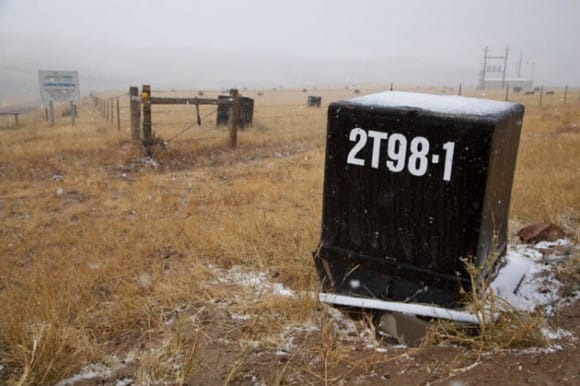EPA Approved Underground Waste Dumping for Uranium Mine Giant

Photo: Abrahm Lustgarten // ProPublica

ProPublica recently published journalist Abraham Lustgarten’s special project series covering injection wells. The latest story in the series converges on Christensen Ranch in Wyoming where industry giant Uranium One mines for uranium and disposes of its waste in an aquifer with EPA permission.
However, the Safe Drinking Water Act outlawed injecting toxic and nontoxic industrial waste into or above water aquifers. Any company wishing to dispose of waste underground must first apply for a deep injection well permit and register with the Underground Injection Control Program (UIC). These permits come in several classes to distinguish between waste and industry.
For example, radioactive material in class I wells that must be deposited below the lowermost underground source of drinking water versus oil and gas waste in class II wells, which can be deposited closer to the surface. Though these different categories are supposed to help protect water sources, the Environmental Protection Agency has allowed for hundreds of exemptions nationwide in the last few decades, Christensen Ranch being one of them.
Over 25 years ago, scientists for the EPA believed water under the Christensen Ranch was “too deep” to be practically extracted and used as a public water source. Current EPA rules allow for aquifer exceptions: “1) [If] the aquifer does not currently serve as a source of drinking water; 2) the total dissolved solids content of the ground water is more than 3,000 mg/L and less than 10,000 mg/L; and, 3) the aquifer is not reasonably expected to supply a public water source in the future.”
At Christensen Ranch the problem lies within plans to increase the mining operation there. State officials have signed off on the deal, since any increase in mining means more economic activity and more tax revenue.
However, the EPA can only grant permission over increasing waste into an aquifer, and it has been slow to make a decision on the matter. Energy advocates are pushing for a renewal, given the EPA had granted permission once before and, as such, they should do it again. On the other hand, former EPA officials are concerned of well leaks and that completely removing pollutants from water is not possible.
The situation at Christensen Ranch underscores the overlaying problem of the sheer number of underground waste and injection wells. According to the UIC Well Inventory of 2011, there are 659,345 injection wells across the nation. Even in water-strapped states like California there exist a staggering 67,302 underground waste wells, the majority being class ll wells. EPA guidelines state every well is to be inspected before operations can begin and reinspected every 5 to 10 years for permits renewal. The EPA currently has a budget of $8.3 billion to use between grants, oil-spill response, improving air quality, protecting waters, technology, and enforcing current environmental laws.
For now, things are business as usual on the Christensen Ranch. It remains unclear what the EPA plans to do, although, at this point, it appears to be a numbers game rather than a test of wills.



